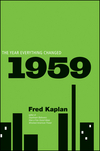 I have just started reading 1959: The Year Everything Changed by Fred Kaplan. He looks at some technological changes such as those marked by the invention of the microchip and the start of the Apollo Space program, but focuses mostly on cultural changes such as the beginning of the Beat Generation and modern jazz.
I have just started reading 1959: The Year Everything Changed by Fred Kaplan. He looks at some technological changes such as those marked by the invention of the microchip and the start of the Apollo Space program, but focuses mostly on cultural changes such as the beginning of the Beat Generation and modern jazz.It occurs to me that one of the key drivers of the cultural revolution was the dissemination of television. At the beginning of 1950 there were perhaps 5 million black and white TV sets in American homes and perhaps 100 TV stations in 60 cities. By 1959 there were some 42 million black and white televisions and that year some 90 thousand color TV sets were sold; TV stations served the vast majority of the American population. TV had become the dominant entertainment medium in the United States. The movie studies were in a state of crisis.

Radio during the 1950s changed its role greatly. At the beginning of the decade it was still the major mass media for entertainment, with audience dominated by the major radio networks. At the end of the decade there were many more AM stations and the growth of FM stations had begun in serious, and the audience for radio had splintered. Radio began to broadcast music to niche markets -- African American, Rock and Roll, classical, jazz, folk, etc. It seems to me that the music of the 40s was rather bland so as to be acceptable to the largest possible number in the mass audience, while the music of the 60s was more varied and much of that broadcast was more innovative and interesting.
The broadcast of dramas shifted from radio to television, while music was left more to radio. The television audience which had been limited to the relatively affluent at the beginning of the decade became a mass audience for the three major networks, and consequently programming shifted to attract the larger audience.
The Change in the Audience
There was an explosion in the demand for education after World War II, including the mass movement to higher education stimulated in part by the GI Bill, but also to a new insistence on completion of secondary education.
There had been a major improvement in the status of African Americans startling during World War II. Indeed, the reaction to the racial atrocities committed by the Nazis seems to have resulted in reduction of prejudice against many minorities.
Women who had stepped into the workplace in huge numbers during World War II, freed by new technologies for the home, also changed their social status radically. The change would be further accelerated by the introduction of birth control pills in 1959.
U.S. mass media are financed by the sale of advertising, and the increasing affluence of many of these niche markets resulted in financial incentives for radio media to target entertainment narrowly to niche audience which might correlate with niche markets for advertiser products.
I am suggesting that changes in popular culture may result from changes in the technology infrastructure and changes in the economic and social conditions of the population -- not a very revolutionary thought.
No comments:
Post a Comment